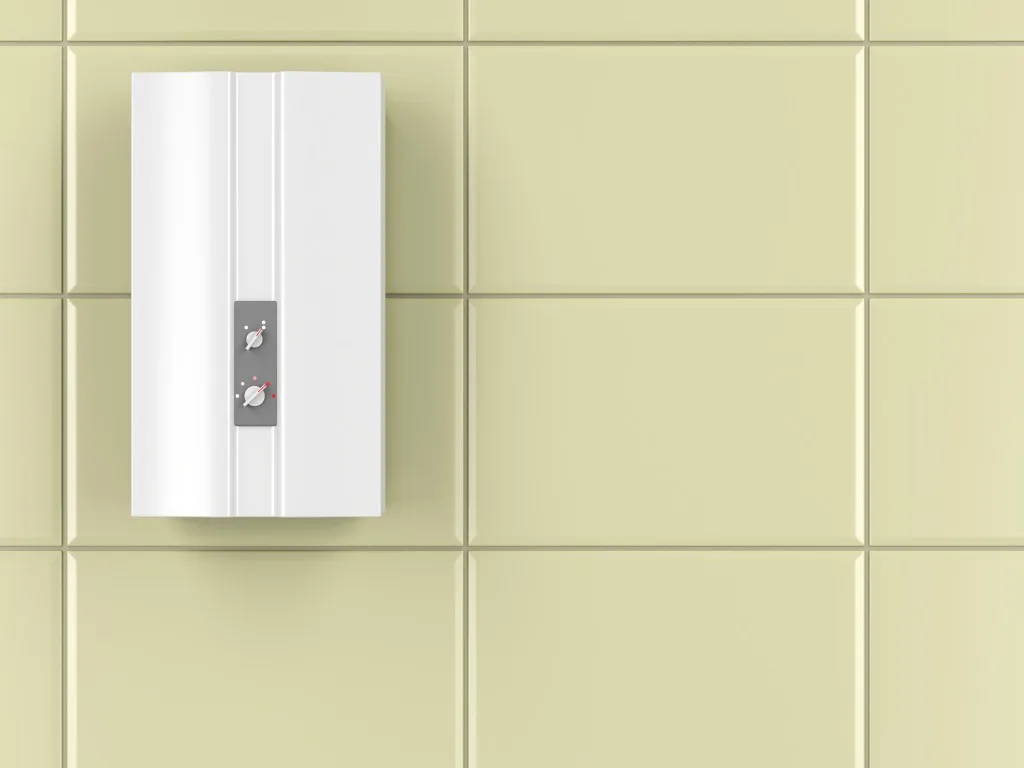Having hot water in an RV is essential for showering and doing dishes. Many RVers have tankless water heaters at home and enjoy the benefits of having hot water on demand.
Some RV manufacturers have replaced standard propane water heaters with tankless water heaters. While you may think this sounds exciting and useful, there are some things you should know about them.
Today, we’re sharing several reasons to avoid an RV tankless water heater.
What Is an RV Tankless Water Heater?
RV tankless water heaters are an alternative to standard tank-based heaters. Tankless options heat water with an electric element or a burner as it travels through the pipe. You’ll get instant hot water as soon as you turn on the faucet. Tank-based water heaters require you to heat several gallons of water and provide a limited amount.
When using an RV tankless water heater, you don’t have to worry about running out of hot water. You’ll have an endless supply of hot water for as long as you can keep power (electric or propane) and water in your RV. You can say goodbye to quick or cold showers while RVing.
Pro Tip: Learn more about the ins and outs of What Is an RV Tankless Water Heater to help you decide if it’s right for you.
Can I Replace My RV Water Heater With a Tankless Water Heater?
Unless you bought your RV somewhat recently, it likely came with a water heater that uses a tank. But you can definitely replace the tank with an electric one.
Tankless options require much less space. However, you’ll likely need to get creative and use a bit of ingenuity to mount and install it. You may need to run electric wiring to the new water heater during the installation. If you don’t have experience running electrical wires, consider hiring a professional to install them. It may be worth the assurance.

5 Reasons to Avoid an RV Tankless Water Heater
Let’s look at a handful of reasons we think you should avoid an RV tankless water heater. They just may have you reconsidering your options.
1. Cost
Because tankless RV water heaters are somewhat new, they’re typically the more expensive option. You may not recoup the expenses depending on how often and how you use your RV.
Expect to pay $250 to $1,000 for an RV tankless water heater. These prices only include the water heater and not the installation or any other parts.
2. Minimal Flow Capacity
Tankless water heaters require a certain flow rate, or they can’t heat water. This flow rate is typically around 0.4 to 0.8 gallons per minute to operate efficiently. However, if you use multiple faucets simultaneously, the water may move too fast for the heater to do its job. Just because you have a tankless water heater doesn’t mean you can expect hot water when running more than one faucet in your RV.
3. Mineral or Sediment Build Up
Maintenance on an RV tankless water heater is essential to keep it running efficiently. Calcium and other minerals or sediment can build up and reduce the water heater’s ability. No matter how often you use your RV, you’ll need to regularly clean the water heater by running white vinegar or other safe cleaning solutions through it.
Failing to do so will result in less efficiency and could cause buildups in the system. These buildups will reduce water flow or entirely block it. If left unaddressed, leaks and other extensive damages can occur.

4. Require a Lot of Electricity
If you plan to use your tankless water heater when plugged in at a campsite, you’ll need at least a 30-amp connection, but most likely 50-amps. They typically use 10 to 15 amps when running. This can easily cause you to trip breakers at the campsite when running air conditioners, microwaves, or other power-hungry electronic devices.
5. They Use More Water
Some RVers don’t like that you have to let the water run for a bit before receiving any hot water. This may not be a big deal for most RVers who stay at campgrounds with water hookups. However, it can cause issues for those who enjoy boondocking. The closer the water heater is to the water fixture, the less water you’ll waste.
What Is the Lifespan of a Tankless Water Heater?
The typical lifespan of a tankless water heater is 15 to 20 years. This is nearly double the lifespan of water heaters with tanks. Because it has no tank, you have less rust and corrosion in these units. These are the two primary reasons for needing to replace alternative water heaters.
Pro Tip: On the hunt for a water heater for your RV? We found the 5 Best RV Water Heaters.
Is an RV Tankless Water Heater Worth It?
An RV tankless water heater is a great option for many RVers. Many consider them the most cost-effective option despite the massive upfront costs. However, depending on how and where you use your RV, it could take some RVers several years to recoup the initial investment.
You may consider them if you plan to stay in a campground regularly and own your RV for several years. On the other hand, if you plan to enjoy a considerable amount of off-grid camping, you might prefer sticking with a tank-based heater. Know how you plan to use your RV to choose which suits you.
Discover the Best Free Camping Across the USA
To be honest with you, we hate paying for camping. There are so many free campsites in America (with complete privacy).
You should give it a try!
As a matter of fact, these free campsites are yours. Every time you pay federal taxes, you’re contributing to these lands.
Become a FREE CAMPING INSIDER and join the 100,000 campers that love to score the best site!
We’ll send you the 50 Best Free Campsites in the USA (one per state). Access the list by submitting your email below: